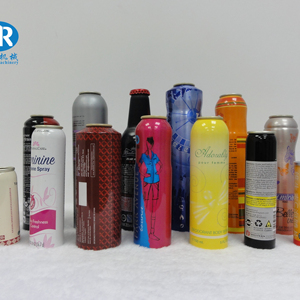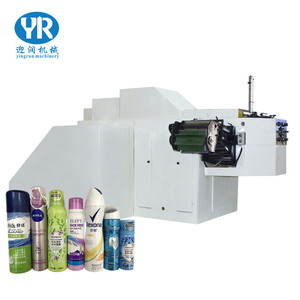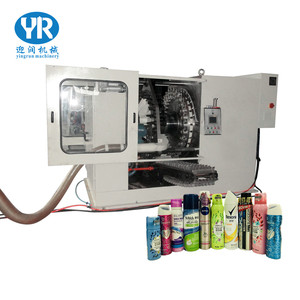
All categories
Featured selections
Trade Assurance
Buyer Central
Help Center
Get the app
Become a supplier

(1711 products available)




















Market Overview: The global aerosol market is projected to reach USD 131.93 billion by 2030, growing at a CAGR of 6.9% from 2024 to 2030, according to Research and Markets. This robust growth is indicative of the increasing demand for aerosol products across various sectors, including personal care, automotive, and food industries. Specifically, the aerosol valves market is expected to grow from USD 876.04 million in 2023 to USD 1,318.01 million by 2030, with a steady CAGR of 6.00%. The rising applications of aerosol propellants in personal care products, such as hair sprays and deodorants, along with the growing use of aerosol packaging in food products, are key drivers behind this expansion. Furthermore, the Asia-Pacific region is anticipated to dominate the market due to rapid industrialization and infrastructural development, which is expected to significantly boost the demand for aerosol cans making machines.
Industry Insights: The competitive landscape for aerosol cans making machines is characterized by a mix of established players and emerging manufacturers, all vying for market share. Companies are increasingly focusing on innovation and energy-efficient solutions to meet the evolving needs of various industries. As reported, major players like AptarGroup and Precision Valve Corporation are at the forefront, continuously enhancing their product offerings. Additionally, the demand for these machines is influenced by consumer behavior shifts towards sustainable packaging solutions, as well as stringent regulations on aerosol propellants. This has led to a focus on developing machines that can produce eco-friendly aerosol solutions. The market also sees a preference for online distribution channels, reflecting a broader trend in manufacturing and machinery sectors where e-commerce platforms like Alibaba.com facilitate connections between suppliers and buyers.
The aerosol can making machine is used to manufacture the container for aerosol products. Different models may have different uses in the production line.
Aerosol Can Body Maker
This machine produces the main body of the aerosol can, which will later be fitted with a nozzle and gasket. It makes cylindrical metal containers from flat metal sheets, thus shaping the fundamental part of the aerosol can.
Aerosol Can Dodger Maker
The dodger is the part of the aerosol can that ensures the product comes out of the nozzle smoothly. The dodger is the platform on which the nozzle rests. The dodger maker produces these essential components, which may be made of plastic or metal.
Seamer
Seamers are the machines used to seam or cover the bottom and top parts of the aerosol can. Typically, they are called seamer because they seam the lid and bottom parts to the body of the can. The seams are usually welded, mechanically clamped, or pressed with a hot or cold adhesive to form a durable seam.
Dodger Inserter
Once the dodger is made, it must be accurately inserted into the can so the product can be dispensed correctly. The inserter puts the dodger into place so it can be seamed with the body of the can.
Can Liner
The liner is the machine that will line the interior of the aerosol can to prevent corrosion or any other problem that can arise from using different types of metals. The machine will coat or apply a layer to the interior of the can.
Considering the overall can-making process, aerosol can manufacturing machine makers have looked seriously into each step to make it more efficient, with each part working steadily at its optimized tempo.
Capacity:
Aerosol can-making machines are expected to produce a high volume of cans in a relatively short period, which is indicated by their capacity. The capacity is typically measured in cans per hour or per minute. Machines with higher capacities are more suitable for large-scale production.
Production Process:
Aerosol can-making machines usually encompass more than one piece of equipment, each of which is expected to facilitate a smooth process.
Types of Cans:
Different machines are suitable for making different types of aerosol cans:
Material Compatibility:
Aerosol cans are usually made from aluminum or steel. The can-making machine must be able to handle these materials.
Modularity and Customization:
Production lines for aerosol can-making allow for modular assembly, meaning that parts can be pieced together like modules as required. This enables customization and flexibility in the production process.
Automation:
Automation in aerosol can-making often involves the use of PLCs (Programmable Logic Controllers), which are specialized digital computers used for industrial automation applications, to control the automated parts in the production line. Robots may be employed to handle, assemble, or inspect cans, and sensors and other automated technologies are used to streamline operations and improve accuracy. The more automated a production line is, the more efficient it can be in producing aerosol cans at a faster rate.
Precision and Quality:
Above all, the importance of precision and quality in aerosol can production cannot be overstated. Precise machining ensures that aerosol cans are made to exact specifications, providing a proper fit for the aerosol valve and ensuring smooth operation. High-quality materials and craftsmanship are essential to produce cans that are durable, reliable, and effective in delivering their contents.
Like any piece of equipment, the aerosol can-making machine needs maintenance, too. Regular maintenance of machines is also crucial for the proper production of end products and may include:
Aerosol cans making machines are useful in various industries that manufacture products packaged in aerosol cans. Here are some of the applications of the machines:
Cosmetics Industry
Aerosol cans are commonly used in the cosmetics industry for products like hairspray, deodorant, sunscreen, and self-tanning products. The Cosmetics industry uses aerosol can making machines to produce cans for their various products.
Food and Beverage Industry
The Food and Beverage industry uses aerosol cans to package whipped cream, cooking spray, and other aerosolized condiments andFlavor. Also, in the industry, some carbonated beverages and spray nutritional supplements are packaged in aerosol cans. That implies that the industry needs an aerosol can making machine to produce the cans needed for these products.
Pharmaceutical Industry
The pharmaceutical industry uses aerosol cans to deliver medications such as inhalers, nasal sprays, and ointments. In this case, the machine is used to ensure precise production of cans for medical use like inhalers and sprays.
Household Products Industry
Items such as air fresheners, cleaning products, pesticides, fabric spray, and paints are manufactured and packaged in aerosol cans. The household product industry uses an aerosol can making machine to produce the cans for these products. Also, some household products are designed to be used in aerosolized form. Therefore, the products must be packaged in aerosol cans.
Automotive Industry
Aerosol cans are used in the automotive industry to package products like spray lubricants, tire inflators, automotive cleaners, and touch-up paints. The automotive industry uses aerosol can making machines to produce the cans for automotive products and accessories that come in aerosol cans.
Entertainment and Sports Industry
The entertainment and sports industries use aerosol cans to package products like sunscreen, insect repellent, and multi-purpose lubricants. The industries usually need portable, efficient packaging for quick-release products. Therefore, they need an aerosol can making machine to produce the cans for their products.
Consider the following factors when choosing an aerosol can-making machine.
Production Rate
The machine's production rate indicates how many cans it can produce in a given timeframe, typically expressed in cans per minute or hour. Choose a machine with a production rate matching the business's required can production.
Can Size and Shape Compatibility
Aerosol cans are made in different sizes and shapes to accommodate various products and market preferences. The most common aerosol can sizes are 100ml, 150ml, 200ml, 250ml, 300ml, 400ml, 500ml, 600ml, 750ml, and 1000ml, including more extensive custom models. There are also different shapes, such as standard cylindrical, dented, and inverted. Select a machine that can produce the desired can sizes and shapes.
Material Compatibility
Verify that the machine can handle the selected can materials, typically aluminum or steel, ensuring proper aerosol can production.
Automation Level
Depending on the production process's efficiency and labor requirements, choose a machine with an automation level (fully automated, semi-automated, or manual) to meet specific needs and production goals.
Machine Dimensions and Footprint
Consider the machine's dimensions and footprint to ensure that it will fit within the available production space and integrate smoothly with existing production lines and workflows.
Energy Consumption
Determine the machine's energy consumption, measured in kilowatts (kW) or kilowatt-hours (kWh), to estimate operating costs and environmental impact. Select an energy-efficient machine to minimize energy costs and promote sustainability.
Operator Training and Support
Consider the training and support services provided by the machine manufacturer, as these factors will affect the successful operation and maintenance of the machine, resulting in a can production of the desired level.
Q1: Which industries primarily utilize aerosol can spray machines?
A1: Several industries use aerosol can machines. The beauty industry is coupled with the personal care segment. Both industries use aerosol machines for sprays, such as body sprays and deodorants. Additionally, the food industry uses aerosol machines in the form of cooking spray cans. The pharmaceutical industry also employs aerosol machines for asthma inhalers and nasal sprays.
Q2: What is the production process for aerosol can machines?
A2: The process for manufacturing aerosol cans with the help of an aerosol can spray machine differs according to the kind of material used. Nevertheless, the main steps include can body forming, necking and flanging, top and bottom end forming, assembling, coating, inspecting, and finally, packing.
Q3: How are aerosol cans environmentally friendly?
A3: The materials used to make an aerosol can are recyclable. This includes aluminum and steel. Furthermore, once an aerosol can is used, it is easy to recycle.